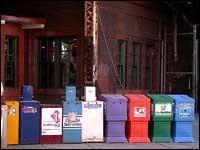Transcript
BOB GARFIELD:
In the journalism business, the last thing you'd want to do is share your secret sources, your painstaking research or career-making scoops. But that tradition of fierce competition is changing - at least in Ohio, where for the last month the state's eight largest papers, including The Cleveland Plain Dealer, The Columbus Dispatch, The Cincinnati Enquirer and The Toledo Blade have been sharing stories and bylines under a group called the Ohio News Organization.
Together they formed a kind of state-wide wire service, not unlike the increasingly expensive Associated Press**, to which they still belong.
The Cleveland Plain Dealer has the highest circulation of the eight Ohio papers. Its editor, Susan Goldberg, says that so far the arrangement seems to be a win-win.
SUSAN GOLDBERG:
Not only are our folks getting bylines in the papers across the state but we're posting headlines on their website, so readers in Columbus, if they want to read our story, they're being driven back to our website. And, you know, the arrangement, of course, is reciprocal.
BOB GARFIELD:
How has it changed the way, for example, you can allocate your reporting resources?
SUSAN GOLDBERG:
I can speak a little better about what Columbus has done because it's changed more for them than us so far. We have three professional sports team, the Indians, the Browns and the Cavaliers, and they are big news all over the state.
Columbus has decided that they're going to use our sports coverage. So our baseball writer is a fellow named Paul Hoynes, and so for the first time in The Columbus Dispatch, when they cover the Indians, there's a byline of Paul Hoynes, and it says Cleveland Plain Dealer there in The Columbus Dispatch.
BOB GARFIELD:
And the readers, have they even noticed?
SUSAN GOLDBERG:
Oh, they have noticed. And, in fact, our reader representative wrote a column about it last Sunday, because when they were traveling outside of Cleveland, they would call us up and say, are you aware that Columbus is running Cleveland Plain Dealer's stories?
[LAUGHTER]
So we decided that we should explain it to them. You know, I think it's a lot better because we can get the stories faster. Nobody is rewriting them. I mean, that was sort of one of the things AP did over the years which, you know, it gathered up the stories from the papers across the state and it rewrote them for a statewide audience. You know, we don't really need that function.
BOB GARFIELD:
Well, let's talk about the Associated Press, because part of this arrangement is in response to the AP and how their prices have been jacked up** and how they do handle stories that they pluck from the members of their cooperative.
SUSAN GOLDBERG:
The main thing is that at a time when we all have made pretty drastic cuts, the one thing about our budgets that hasn't really changed much is our AP bill. Our AP bill is about a million dollars just at The Plain Dealer. That's a big hunk of my budget.
So, you know, we've set up this little cooperative. I don't know how it'll work in the future, but right now it's working really well.
BOB GARFIELD:
It's easy for Internet users to get all kinds of information from newspapers all over the world and from other sources, including directly from wire services, which is one of the forces that's affecting daily journalism so severely.
But one of the things that daily newspapers still offer their readers is the customized local and regional reporting. But if regional reporting becomes commodified through cooperatives like this, aren't you just one step closer to making your individual brand, The Cleveland Plain Dealer, irrelevant?
SUSAN GOLDBERG:
Well, I don't really think so. I mean, we've always had access to news from all over the state. It was just, you know, it went through the AP mill. I frankly think we're getting better, more distinctively written stories because they're not going through the AP mill.
But I also think that it does allow us to make some smarter choices. We, and everybody else, have smaller staffs than we used to, and we've got to pick some priorities.
BOB GARFIELD:
Now, we began by talking about competition. There's an ongoing story, scandals enveloping the Ohio attorney general's office that, at least up until very recently, would have classically been the kind of story that various large Ohio papers were battling one another to break the news first. Do you find yourself using other people's work on this story?
SUSAN GOLDBERG:
You know, we have run one story, I think, that The Dispatch wrote on it. But you are right. This has been an incredibly competitive story. And The Dispatch broke the story, but we've pretty much broken the news on the story ever since the first one.
You know, under this agreement, editors do have the ability to withhold stories from the others. And so, you know, this is, as you say, a classically competitive story, and we're all in it for the fight. We're slugging it out.
BOB GARFIELD:
Well, Susan, good luck with this project.
SUSAN GOLDBERG:
Thanks very much.
BOB GARFIELD:
Susan Goldberg is editor of The Cleveland Plain Dealer.
**We were mistaken when we stated that the Associated Press has raised its rates. On April 14, 2008 the Associated Press decided to cut 2009 fees for its members.

